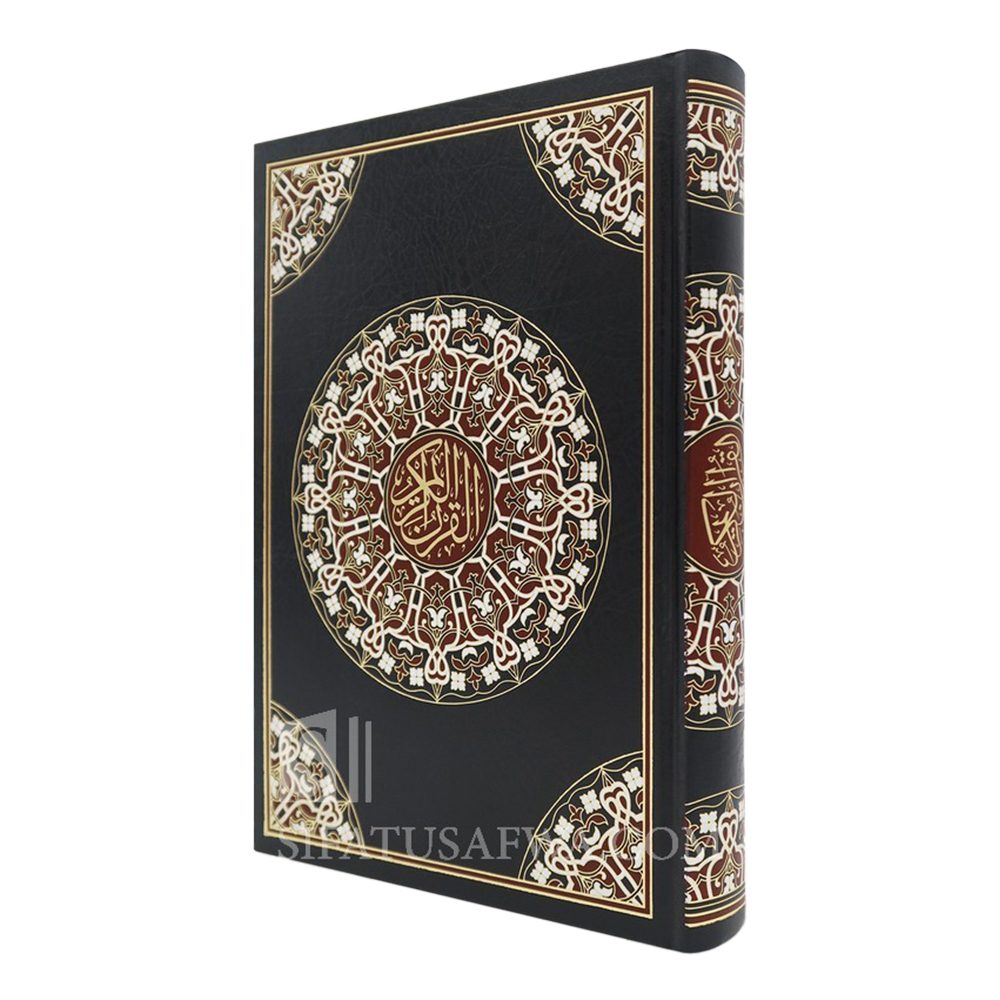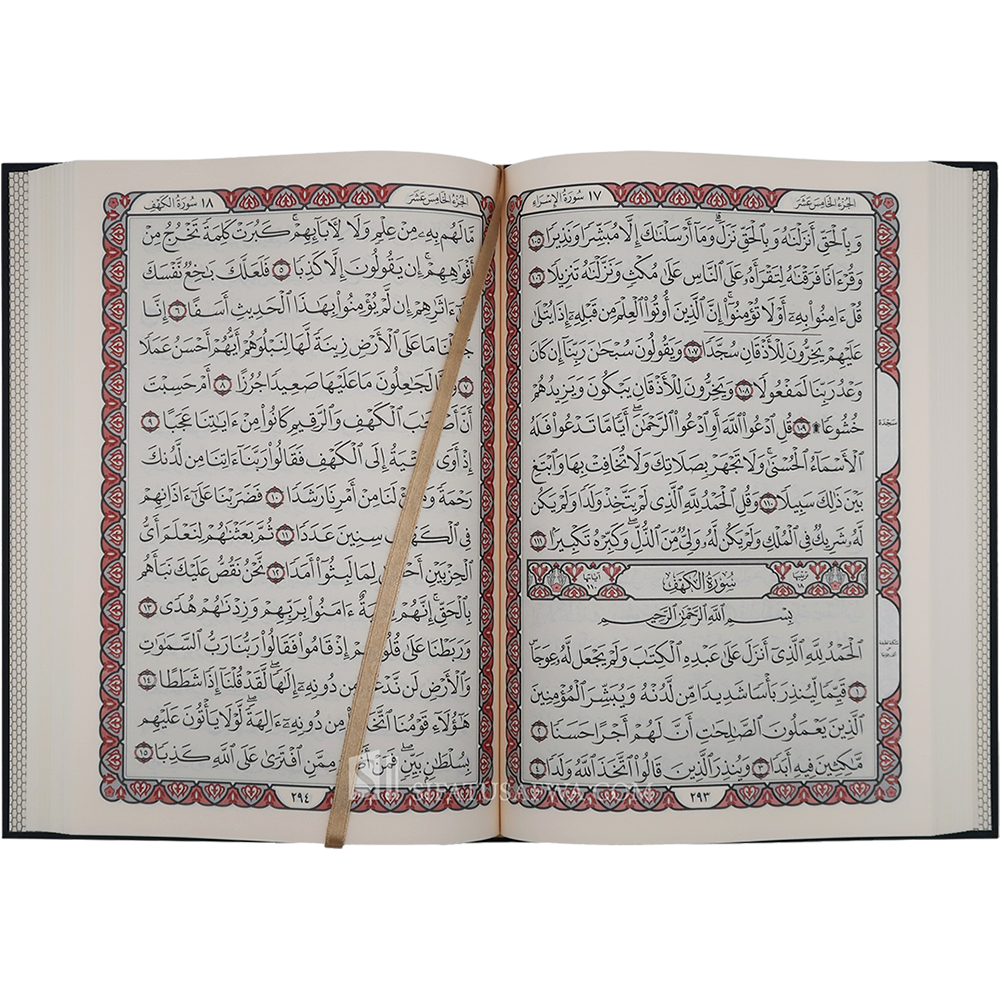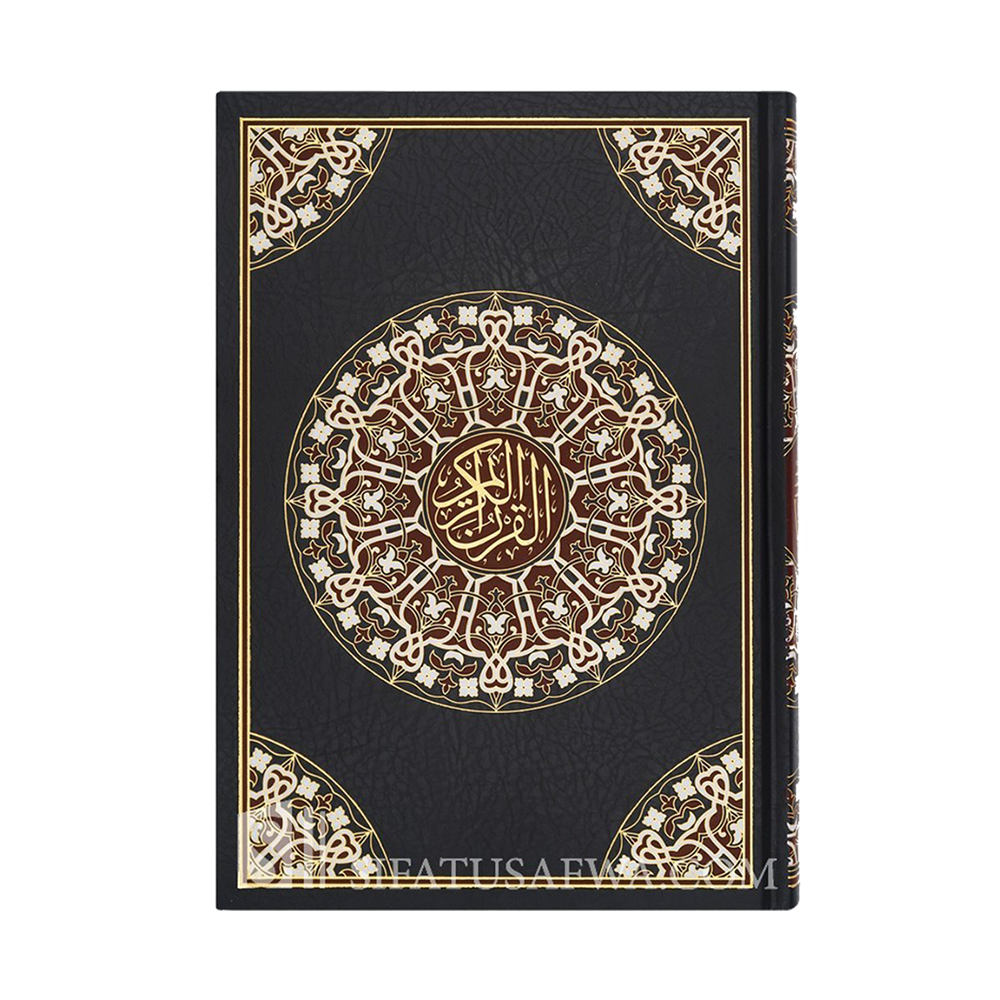


When Al-Risala Foundation resolved to print the Holy Qur’an, and wanted – in order to get closer to God Almighty – to produce it in the best form, the most beautiful handwriting, and the most accurate setting, it saw that the best way to fully achieve its goal was to write a new copy of the Qur’an, so it contacted the master calligrapher, Uthman. Taha, who has gained extensive experience and knowledge in this field, completed writing three copies of the Holy Qur’an, so the Foundation commissioned him to write a new, fourth copy. With this assignment, he responded to a desire in himself, as he liked to write a copy of the Qur’an and deposited with it a summary of his experience and juice. He developed his art in order to reach the height of beauty with it, and bring it closer to the peak of perfection. This edition, which was issued - praise be to God Almighty - was a wonderful, radiant and rare masterpiece.
An introduction to the history of codification of the Qur'an Praise be to God, the Guide of those who seek His guidance, the Protector of those who fear Him, the Sufficient of those who seek His pleasure, praise that reaches the end of the full term and its end, and the perfect prayers and peace be upon our master Muhammad and his family and companions and those who follow him. As for after: The codification of the Noble Qur’an passed through three eras: First: Collecting at the time of the Prophet, may God’s prayers and peace be upon him: And it consisted in writing the verses, arranging them, and putting them in their special place in their suras, but with the writing scattered and separated between sticks, bones, stones, patches, and the like, according to what was available to them for writing tools, although at that time the reliance was on memorization and memorization. Second: Collecting at the time of Abu Bakr Al-Siddiq, may God be pleased with him: It was about transmitting the Qur’an and writing it in sheets in the order of the verses as well, limiting it to what its recitation was not copied, documenting it with tension and consensus, and its purpose was to record the Qur’an and restrict it to writing in an orderly collection, lest something of it be lost with the death of its bearers and memorizers. Third: Collecting at the time of Othman, may God be pleased with him: When the conquests expanded at the time of Othman, and urbanization was excluded, and Muslims dispersed in regions and countries, and a new youth sprouted that needed to study the Qur’an, and the people’s covenant with the Messenger - may God’s prayers and peace be upon him - with revelation and revelation, and the people of every region of Islam took to reading those who were famous among them among the Companions, so there was a difference between them. In the letters of performance and the faces of reading, in a way that opened the door to discord and conflict in reading the Qur’an, similar to what was between the Companions before they knew that the Qur’an was revealed in seven letters. To his ruling and they all issued his opinion, and the disease worsened and there was almost sedition in the land and great corruption, and in that Al-Bukhari narrates in his Sahih with his chain of transmission on the authority of Ibn Shihab that Anas bin Malik told him (that Hudhaifa bin Al-Yaman came to Othman, and he was conquering the people of Levant in the conquest of Armenia and Azerbaijan with The people of Iraq, so Hudhayfah was terrified of their differences in the recitation, so Hudhayfah said to Othman: O Commander of the Faithful, realize this nation before they differ about the Book, as the Jews and Christians differ! Then he commanded Zaid bin Thabit, Abdullah bin Al-Zubayr, Saeed bin Al-Aas, and Abd Al-Rahman bin Al-Harith bin Hisham, so they copied it into the Qur’an, and Othman said to the three Quraish men: If you and Zaid bin Thabet disagree about something from the Qur’an, write it in the language of Quraysh, for it was revealed in their tongue, so they did it until when They copied the sheets into the volumes, Othman returned the sheets to Hafsa, so he sent to every region a copy of what they had copied, and ordered everything else from the Qur’an in every sheet or volume to be burned) End. Uthman's approach to writing the Qur'an: That they do not write in these volumes except what they have verified to be the Qur’an, and they know that it has settled in the last verse, and what they are certain of its authenticity from the Prophet - may God’s prayers and peace be upon him - from what has not been copied, and they leave what is other than that such as reading: “So proceed to the remembrance of God” instead of the word ? Expand? [Al-Jumu’ah: 9] and towards: “And there was behind them a king who seized every good ship by force” by adding the word “good” … [Al-Kahf: 79] and so on … That they write multiple copies of the Qur’an in order to send what was agreed upon to the countries of the Muslim countries, which are also numerous. And that they differ in affirmation, deletion, substitution, and so on, because, may God be pleased with him, he intended to include the seven letters, and they made them free of dots and shapes in order to achieve this possibility as well. We distinguish it from the Almighty’s saying: ? And look at the bones, how do we pronounce it?… [Al-Baqarah: 259] And the? we raise it? With the view and the zay, and it has the rose of reading, and towards ? So find out? From the Almighty saying:? If an evil-doer comes to you with news, verify it. ... [Al-Hujurat: 6] It is also read? so you prove it? When it is devoid of dots and form, it is another reading. As for the words that indicate more than one reading when they are devoid of dots and shapes, while they are mentioned in another reading as well, they have drawn them in some of the Qur’an with a drawing that indicates a reading, and some others indicate a second reading such as ? guardian? Weakening of the Almighty’s saying: ?And Abraham bequeathed it to his sons? [Al-Baqara: 132] ? recommended? with hams in some of the Qur’an, and they are two correct readings, and towards reading ? Beneath it rivers? [Repentance: 89] From the Almighty saying: ? Rivers run under it? by ?who? before ? rivers? They are also reading. In sum, the word in which the faces of the readings do not differ, they inevitably drew it in one form, but the one in which the faces of the readings differ, it was not possible to draw it in a possible line for all of these faces. in another Qur'an. And they were avoiding writing with the two letters in one Qur’an, lest they imagine that the word was revealed repeatedly in both sides in one reading. And the other is in the footnote, lest he be delusional that the second is a correction of the first. What called the Companions, may God Almighty be pleased with them all, to follow this plan in drawing and writing the Qur’an is that they received the Qur’an from the Messenger of God, may God’s prayers and peace be upon him, in all its readings, and in all its letters that were revealed to it, and so that it would not be said that they omitted anything from its readings, or prevented anyone from reading it. By any letter he wills, even though they are all transmitted, he transmitted frequently from the Prophet, may God’s prayers and peace be upon him, where he says, peace be upon him: “Which of these did you read, you were right, so do not argue.” And his method, may God be pleased with him, was that he said to those Quraishites: “If you and Zayd disagree about something from the Qur’an, write it in the language of Quraysh, for it was revealed in their tongue.” So they did so until after they copied the sheets into the Mus-hafs, Othman returned the sheets to Hafsa, and he sent to every region a Mus-haf of what they copied, and he commanded what else. of the Qur'an in every newspaper Or a Mushaf to be burned to close the door to sedition. And he only did that after consulting the Companions and gaining their approval. Abu Bakr al-Anbari narrated on the authority of Suwayd bin Ghafleh, he said: I heard Ali bin Abi Talib, may God be pleased with him, say: “O people, fear God and beware of exaggeration in Othman and your saying that he burned the Qur’ans, for by God he only burned them.” On the authority of a group of us, the companions of the Messenger of God, may God’s prayers and peace be upon him.” And on the authority of Omar bin Saeed, Ali bin Abi Talib, may God be pleased with him, said: “If I were the governor at the time of Othman, I would have done in the Qur’ans the same as what Othman did.” May God be pleased with everyone, and may He reward them with the best reward for this. the favor. That was the beginning. A group of great companions and professors pushed Professor Radwan Daaboul to start publishing their works, and it was God's will and permission, and the circle expanded to include the great thinkers of the Arab and Islamic world. The beginning was based on intellectual material, guiding the nation, enlightening it, and educating it in the midst of currents alien to our identity trying to tamper with and seize the void. The nation in those days was living in a state of non-existence after the sunset of the Islamic Caliphate, living a life of division into homelands, religions into sects and sects, and the tribe into clans and factions, and material extremism and blind partisanship with a narrow perspective. It is one nation whose borders are wide to strike deep into China in the east and pass through the sea of darkness in the west. From the first day we established the “Resala Foundation”, it was clear to us that we belong to an ancient nation that is deeply rooted in history…. A nation may be weakened, or covered by a veil, or slipped by a foot.... But the factors of survival in it are stronger than annihilation... and its civilized immunity is more lasting than every disease... Among the factors of its survival is this immortal heritage... which the ancestors left behind us, a living, developed heritage that refuses to be forgotten, that struggled with time and tribulations until it reached us with a pure, alive and renewed heritage. The matter of her religion, which is the basis of her life, and her history, which is her memory, so that her steps towards the future are confident steps, so that her will is not undermined by guile and is not diverted from her path by ignorance. Heritage is nothing but the firm foundation upon which contemporary studies are based, which dialogue with new generations with an open mind...insight into stumbling blocks in order to avoid them, and guide them on the way to make sure of their steps... Hence, it is up to us to publish all the dialogues or ideas that serve our contemporary life... or creations that increase its richness... He did not exclude from our interests a child - w…